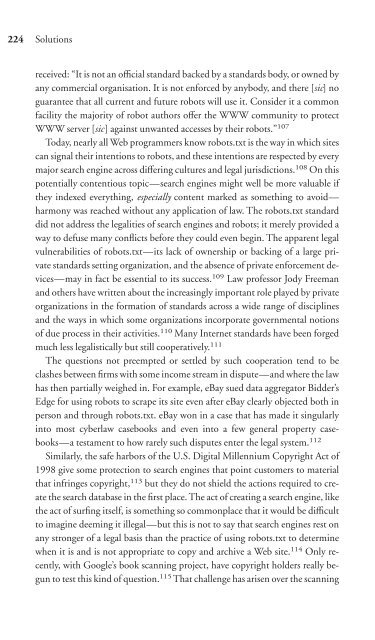Download - Future of the Internet â And how to stop it.
Download - Future of the Internet â And how to stop it.
Download - Future of the Internet â And how to stop it.
You also want an ePaper? Increase the reach of your titles
YUMPU automatically turns print PDFs into web optimized ePapers that Google loves.
224<br />
Solutions<br />
received: “It is not an <strong>of</strong>ficial standard backed by a standards body, or owned by<br />
any commercial organisation. It is not enforced by anybody, and <strong>the</strong>re [sic] no<br />
guarantee that all current and future robots will use <strong>it</strong>. Consider <strong>it</strong> a common<br />
facil<strong>it</strong>y <strong>the</strong> major<strong>it</strong>y <strong>of</strong> robot authors <strong>of</strong>fer <strong>the</strong> WWW commun<strong>it</strong>y <strong>to</strong> protect<br />
WWW server [sic] against unwanted accesses by <strong>the</strong>ir robots.” 107<br />
Today, nearly all Web programmers know robots.txt is <strong>the</strong> way in which s<strong>it</strong>es<br />
can signal <strong>the</strong>ir intentions <strong>to</strong> robots, and <strong>the</strong>se intentions are respected by every<br />
major search engine across differing cultures and legal jurisdictions. 108 On this<br />
potentially contentious <strong>to</strong>pic—search engines might well be more valuable if<br />
<strong>the</strong>y indexed everything, especially content marked as something <strong>to</strong> avoid—<br />
harmony was reached w<strong>it</strong>hout any application <strong>of</strong> law. The robots.txt standard<br />
did not address <strong>the</strong> legal<strong>it</strong>ies <strong>of</strong> search engines and robots; <strong>it</strong> merely provided a<br />
way <strong>to</strong> defuse many conflicts before <strong>the</strong>y could even begin. The apparent legal<br />
vulnerabil<strong>it</strong>ies <strong>of</strong> robots.txt—<strong>it</strong>s lack <strong>of</strong> ownership or backing <strong>of</strong> a large private<br />
standards setting organization, and <strong>the</strong> absence <strong>of</strong> private enforcement devices—may<br />
in fact be essential <strong>to</strong> <strong>it</strong>s success. 109 Law pr<strong>of</strong>essor Jody Freeman<br />
and o<strong>the</strong>rs have wr<strong>it</strong>ten about <strong>the</strong> increasingly important role played by private<br />
organizations in <strong>the</strong> formation <strong>of</strong> standards across a wide range <strong>of</strong> disciplines<br />
and <strong>the</strong> ways in which some organizations incorporate governmental notions<br />
<strong>of</strong> due process in <strong>the</strong>ir activ<strong>it</strong>ies. 110 Many <strong>Internet</strong> standards have been forged<br />
much less legalistically but still cooperatively. 111<br />
The questions not preempted or settled by such cooperation tend <strong>to</strong> be<br />
clashes between firms w<strong>it</strong>h some income stream in dispute—and where <strong>the</strong> law<br />
has <strong>the</strong>n partially weighed in. For example, eBay sued data aggrega<strong>to</strong>r Bidder’s<br />
Edge for using robots <strong>to</strong> scrape <strong>it</strong>s s<strong>it</strong>e even after eBay clearly objected both in<br />
person and through robots.txt. eBay won in a case that has made <strong>it</strong> singularly<br />
in<strong>to</strong> most cyberlaw casebooks and even in<strong>to</strong> a few general property casebooks—a<br />
testament <strong>to</strong> <strong>how</strong> rarely such disputes enter <strong>the</strong> legal system. 112<br />
Similarly, <strong>the</strong> safe harbors <strong>of</strong> <strong>the</strong> U.S. Dig<strong>it</strong>al Millennium Copyright Act <strong>of</strong><br />
1998 give some protection <strong>to</strong> search engines that point cus<strong>to</strong>mers <strong>to</strong> material<br />
that infringes copyright, 113 but <strong>the</strong>y do not shield <strong>the</strong> actions required <strong>to</strong> create<br />
<strong>the</strong> search database in <strong>the</strong> first place. The act <strong>of</strong> creating a search engine, like<br />
<strong>the</strong> act <strong>of</strong> surfing <strong>it</strong>self, is something so commonplace that <strong>it</strong> would be difficult<br />
<strong>to</strong> imagine deeming <strong>it</strong> illegal—but this is not <strong>to</strong> say that search engines rest on<br />
any stronger <strong>of</strong> a legal basis than <strong>the</strong> practice <strong>of</strong> using robots.txt <strong>to</strong> determine<br />
when <strong>it</strong> is and is not appropriate <strong>to</strong> copy and archive a Web s<strong>it</strong>e. 114 Only recently,<br />
w<strong>it</strong>h Google’s book scanning project, have copyright holders really begun<br />
<strong>to</strong> test this kind <strong>of</strong> question. 115 That challenge has arisen over <strong>the</strong> scanning


